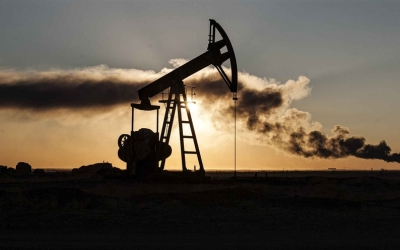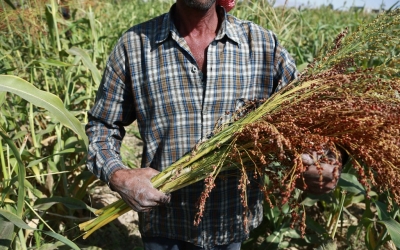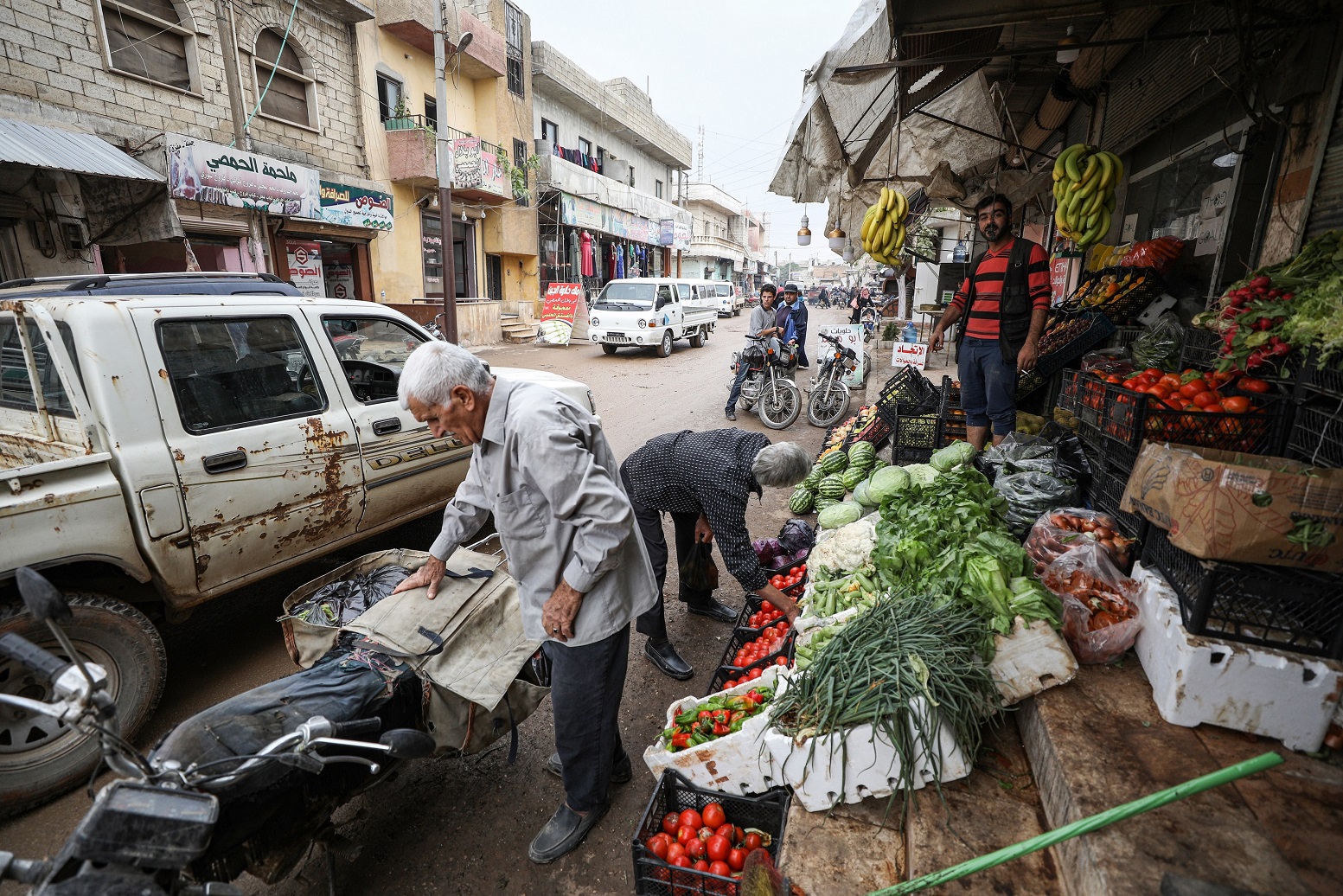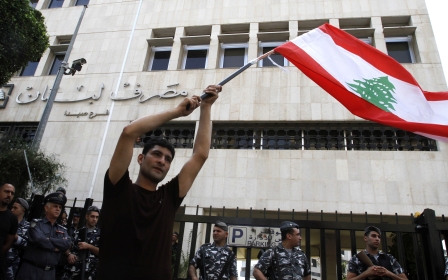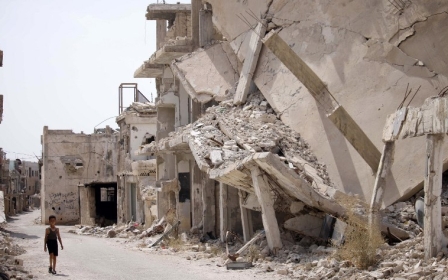Syria's economy goes from very bad to worse as Lebanon's crisis hits
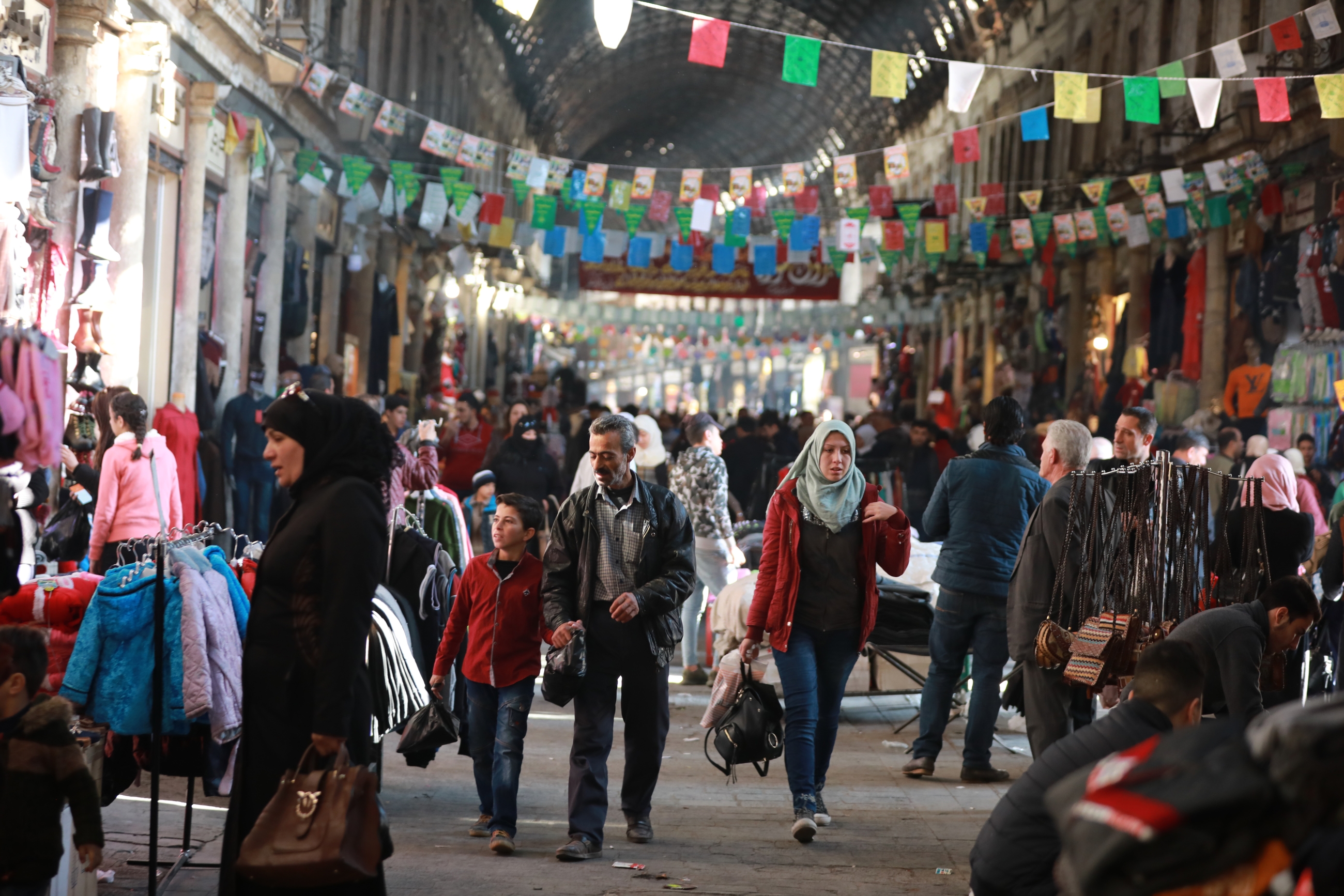
When the United States, the European Union and the United Nations imposed sanctions on Syria in the first year of its civil war in 2011, they were intended to financially squeeze the government of Bashar al-Assad.
But Lebanon was also caught in the crosshairs, pressured to curb Syria's access to the global financial system given the longstanding banking ties between the two states.
New MEE newsletter: Jerusalem Dispatch
Sign up to get the latest insights and analysis on Israel-Palestine, alongside Turkey Unpacked and other MEE newsletters
When Syria nationalised its banks in the 1960s, it was to Lebanon that private capital fled. Banks were established there by Syrian investors, such as BLOM Bank, the country’s third largest, which is still managed by the Azhari family.
"It's pretty historical in terms of the relations between the Syrians and the Lebanese banking sector," said Jihad Yazigi, editor of the Syria Report, an economics news bulletin.
Throughout the Lebanese Civil War (1975-1990) and the Syrian occupation until 2005, it was Lebanon that acted as a foreign exchange hub for Damascus. Syria had been a closed economy, and it had been illegal to trade dollars outside of state-owned banks.
After the Syrian withdrawal following massive demonstrations in Beirut in the spring of 2005, and the liberalisation of the Syrian economy, Lebanese banks opened five affiliates in Syria.
"The dependency on Lebanon decreased as international transfers were allowed [in Syria], although Lebanon was considered safer, and had banking secrecy," said Yazigi.
Indeed, leaked US embassy cables from 2008 stated that individuals close to the Assad elite had accounts under different names in Lebanon, including sanctioned billionaire businessman and cousin of Assad, Rami Makhlouf.
Capital outflow
As the uprising spread in Syria, and as the situation turned increasingly violent and sanctions started to bite, Syrian capital started to move out of the country.
Media reports claimed billions of dollars were flowing into Lebanon.
On 2 July 2011, The Economist magazine reported that more than $20bn had been transferred, while other reports indicated Syrian deposits accounted for anywhere between 10 to 40 percent of Lebanon's total deposits.
The Financial Times reported that 80 percent of wealthy Syrians kept their money in Lebanon.
'Whatever the outcome [of the uprising]in Lebanon, it's going to be very negative for Syria, for business and the people'
- Jihad Yazigi, editor of the Syria Report
However, it was, and still is, unclear how much Syrian cash was parked in Lebanon.
"There is banking secrecy, and it is hard to track these transactions. It's true a lot of people have accounts, especially Damascenes, but Syrians having $20bn in the Lebanese system is an exaggeration," said Yazigi.
As Lebanon felt the pressure to comply with international sanctions on Syria, Riad Salameh, the governor of Banque du Liban (BDL), Lebanon's central bank, publicly stated in 2012: "There is no money smuggling from Syria to Lebanon."
Lebanese banks went on the defensive, closing accounts of sanctioned Syrians and downplaying sanctioned individuals on the boards of Syrian banking affiliates, such as Rami Makhlouf in Bank Byblos Syria, and Ahmad al-Kuzbari in Banque Libano-Francaise' Syrian arm, Bank Al Sharq.
"The banks were very reluctant to allow Syrian nationals to open accounts, even those not sanctioned," said Dan Azzi, former CEO of Standard Chartered in Lebanon.
International pressure further mounted as Washington introduced the Hezbollah International Financing Prevention Act (HIFPA) in 2014, later renewed as HIFPA II in 2018, to try and isolate Hezbollah financially.
Hezbollah was fighting alongside Syrian government forces, and the Lebanese banking sector was once again on the back foot, keen to show it was a conduit for neither Syrian cash nor Hezbollah financiers.
Slippery slope
Over the border, as the Syrian conflict intensified, the country's finances dwindled.
In early 2016, the International Monetary Fund estimated that Syria had $1bn in foreign currency holdings, while the World Bank estimated them to be as low as $700m, down from $20bn in 2010, according to Yazigi.
The Syrian pound (SYP) meanwhile was on a slippery slope, depreciating from trading at 47 SYP to the US dollar in 2010 to 400 SYP by 2016.
By the beginning of 2019, the pound had reached 535 to the dollar, sliding to 663 SYP in October as Lebanon tightened up its foreign transfers and cracks in the Lebanese financial system started to show.
On 17 October, an uprising broke out in Lebanon, leading the banks to shut their doors for two weeks, subsequently imposing unofficial capital controls and limiting withdrawals in US dollars.
Just as Lebanon was caught up in the sanctions on Damascus, Syria became ensnared in the Lebanese financial crisis.
"The Lebanese crisis closed a major door for Syria to get dollars," said a former Syrian banker who requested anonymity.
The true scale of Syria's dependency on Lebanon for greenbacks, needed to trade internationally, became more apparent as Lebanese banks ran out of dollars.
In mid-November the Syrian pound hit 822 to the dollar, and soon after, as the Lebanese banking sector limited withdrawals of dollars to $300 or less a week, it reached 1,000 SYP to the greenback.
"The financial pressure on Lebanon showed all the countries connected to the banking sector, and Syria was obviously very dependent on the Lebanese financial sector," a Lebanese compliance officer at a major bank said on condition of anonymity.
"Everyone knew that Syria was using Lebanon to evade the sanctions, the USA knew, so what has happened is not a surprise. They have billions tied up, and the immediate effect was the depreciation of the Syrian pound," he said.
The extent to which financial transfers were legitimate or not is unclear, with Lebanon only declaring the deposit figures of non-residents, without stating the breakdown by nationality.
'Lebanon was used as a gateway through shell companies, service providers and third parties'
- former Syrian banker
Azzi said Syrians had billions of dollars in Lebanon, "but for the most part it is legitimate money".
On the illegitimate side, it was entities and people under sanctions who used Lebanon to gain access to international markets to buy goods, or, as the Financial Times reported in September, to buy real estate in Moscow through shell companies registered in Lebanese offshore bank accounts.
"Lebanon was used as a gateway through shell companies, service providers and third parties," said the former Syrian banker.
"Although [BDL governor] Salameh always said that Syrians were not using the banking sector, there are billions of dollars sitting in Lebanese banks, and Syrians want them back."
From very bad to worse
The owner of a foreign exchange bureau in Lebanon, speaking anonymously, said that Syrians changing pounds for dollars had continued despite the sanctions.
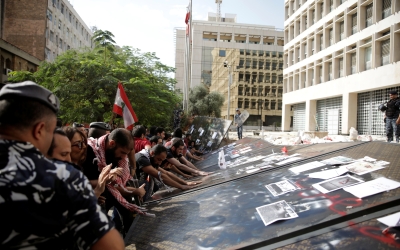
"They were able to buy as much as they wanted in dollars, no questions asked. Now it is even harder for Syrians than Lebanese," he said.
As a result of the dollar shortage, Syrian business has ground to a "halt because of Lebanon," said the former Syrian banker.
To Azzi, the unofficial capital controls freezing bank deposits in Lebanon, including Syrians' money, has been "bad for Assad but good for the Lebanese banking sector" as it tried to manage the crisis.
"The Syrians got screwed like the Lebanese. Syrians have to use another conduit now, which is more expensive."
If Syrians are able to withdraw money it is in Lebanese lira (LBP), which would then have to be exchanged into dollars.
The lira is officially fixed to the dollar, with a peg at 1,507 LBP to a dollar - but due to the shortage of dollars, it is currently trading at over 2,400 LBP, 60 percent higher.
"There are two prices, one in the banks, which nobody uses, and the one in our exchange offices, which is 60 percent higher," said the exchange dealer.
The depreciation and lack of access to dollars for imports will impact the Syrian economy hard.
"Anyone who earned some dollars, or needs to import goods with dollars, is impacted," said Yazigi.
"The Syrian economy is already very bad, and going to get worse. Whatever the outcome [of the uprising] in Lebanon, it's going to be very negative for Syria, for business and the people," he said, referring to anti-government protests that have continued since mid-October.
Syrian wealth is estimated at a fifth of what it was when the civil war broke out. The Global Wealth Report, issued by Swiss bank Credit Suisse, estimated Syrian total wealth at $21bn in mid-2019. At the end of 2010, it was around $117bn.
Syria and Lebanon are going to be further impacted by the passing of the Caesar Syria Civilian Protection Act by the US Senate in December.
The act, which still needs to be signed by President Donald Trump, imposes additional sanctions on Syria for war crimes.
“The Caesar Act is important as it affects third-party countries, and is going to have negative consequences for Lebanon's relations with Syria. It will be more risky to do business with Syria because technically you can face sanctions from the Americans," said Yazigi.
This is bad news for Lebanese construction firms that were angling for contracts for the reconstruction of Syria, a much-needed boost for the economy.
"If you get a government-awarded contract for rebuilding, Lebanese firms would be liable under the sanctions," said Yazigi.
This article is available in French on Middle East Eye French edition.
Middle East Eye delivers independent and unrivalled coverage and analysis of the Middle East, North Africa and beyond. To learn more about republishing this content and the associated fees, please fill out this form. More about MEE can be found here.


